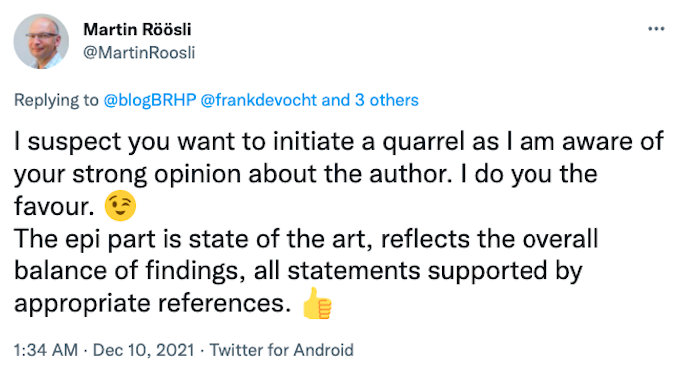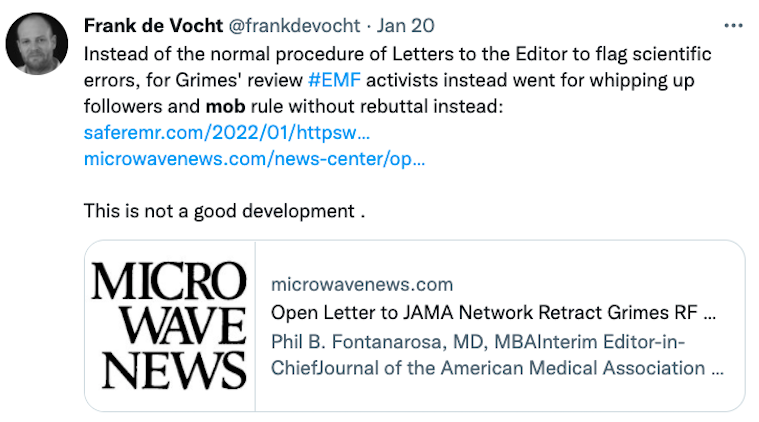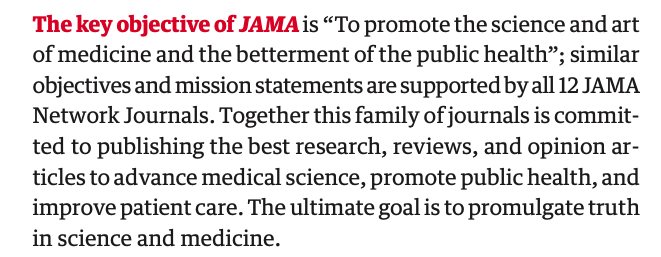Pressure Mounts To Retract
Grimes RF–Cancer Review
Former Director of NIEHS Endorses Removal
Senior environmental health scientists are calling for JAMA Oncology to retract a review of RF radiation and cancer by David Robert Grimes, a physicist at Dublin City University.*
Grimes’s paper, which was posted on the journal’s website on December 9th, has prompted a barrage of complaints to Nora Disis, the editor of JAMA Oncology.
(For background, see Microwave News’ Four Reasons for Retraction, posted last week.)
Among those calling for retraction is Linda Birnbaum, who, for ten years, 2009-2019, was the director of the National Institute of Environmental Health Sciences (NIEHS) and the National Toxicology Program (NTP). Ronald Melnick, who led the team that designed the NTP RF–cancer study, is another harsh critic.
Both Birnbaum and Melnick signed a letter to JAMA Oncology coordinated by the Environmental Health Trust, a group founded by Devra Davis in 2007. In addition to these three, eight others have signed EHT’s call for retraction.
In the letter, they told Disis:
“[T]he review inaccurately presents the current state of science, cherry-picks studies, misrepresents study findings and entirely omits key research studies indicating that cell phone radiation can, and does, cause cancer.”
The letter runs five pages and includes 6 pages of references. EHT appended a 42-page document that catalogs Grimes’s “inaccuracies, mischaracterizations and critical omissions.”
Another of those calling for retraction is David Carpenter, a public health physician who is the director of the Institute for Health and the Environment, part of the University at Albany in upstate New York.
“The article by Grimes should be withdrawn by JAMA Oncology,” Carpenter told Microwave News. “It is factually incorrect and there is no basis for any of the conclusions drawn.”
Carpenter is himself the coeditor-in-chief of Reviews on Environmental Health, a peer-reviewed journal, and was also the coeditor-in-chief of Environmental Pollution from 2015 to 2019. Carpenter has submitted a formal letter to the editor for publication in JAMA Oncology. Letters to the journal are limited to a maximum of 400 words.
“Science and facts don’t seem to matter for some people,” Carpenter told me.
Kent Chamberlin, a professor and chair emeritus of the Department of Electrical and Computer Engineering at the University of New Hampshire in Durham, has told Disis that “the only moral and ethical path forward” is retraction.
Among Chamberlin’s complaints is Grimes’s “use of pejoratives when describing views contrary to his own (e.g., ‘fringe’ and ‘ludicrous’).” These, he wrote, “are routinely used by industry to discredit any publication that reveals harm associated with wireless radiation” and are “not appropriate in scientific publications.”
Joel Moskowitz of the School of Public Health at the University of California, Berkeley, was one of the first to call for retraction, writing to Disis on December 20. Moskowitz is compiling a list of critiques of Grimes’s review on his website, Electromagnetic Radiation Safety.
In 2019, when Moskowitz warned that very little research had been done on 5G and health, Scientific American published a rebuttal by Grimes. (It’s still a mystery why SciAm ran Grimes’s comment; Moskowitz’s column was already a rebuttal to a piece by Ken Foster, who offered assurances of safety.) There too, Grimes resorted to pejoratives: he called Moskowitz a scaremonger (more here).
Support for Grimes from ICNIRP
Martin Röösli, an associate professor of environmental epidemiology at the University of Basel, Switzerland, is one of the few to go public in support of Grimes. In a tweet posted the day after its online publication, Röösli called Grimes’s analysis of the RF-cancer epidemiology literature “state-of-the-art.”

Röösli is a member of the International Commission on Non-Ionizing Radiation Protection, better known as ICNIRP, which shares Grimes’s outlook that there is no RF–cancer risk.
Frank de Vocht, an epidemiologist at the U.K. University of Bristol, largely agrees with Röösli. Here is de Vocht’s tweet on Grimes:
(De Vocht has asked that readers see his full Twitter thread.)
In a later tweet, de Vocht scolded “activists” (as well as Microwave News) for seeking retraction rather than submitting 400-word letters to the editor. He described the move as resorting to “mob rule.”
Will JAMA Oncology Retract?
What are the chances that Disis and Phil Fontanarosa, the interim editor-in-chief of all AMA publications, will decide to purge Grimes’s review from JAMA Oncology?
Linda Birnbaum thinks the odds are “not very good.” Still, she explained in a brief email exchange, the detailed critique she worked on with the EHT was worth the effort because, even though JAMA Oncology will not publish it, the analysis could appear elsewhere.
Chris Portier agrees that retraction is unlikely. “My guess is the editor will not retract,” he told me. Portier is a former associate director of the NTP and was a member of the IARC panel that found RF radiation to be a possible human carcinogen in 2011; he is now semi-retired and living in Switzerland.
“Any positive evidence is treated [by Grimes] as coming from a failed experiment, any positive [epidemiological] finding is recall bias, any flaws in negative studies are ignored,” Portier told Paul Thacker in an interview for an article in The Disinformation Chronicle.
That may not be enough to force retraction, Portier said in an email to Microwave News. “Just because I believe the work is biased, shoddy and not even close to a complete review would not warrant retraction, because the formal peer reviewers were obviously of a different opinion,” Portier told me. But, he added, “If it can be established that Grimes has violated the publishing guidelines with the intent to mislead, I would favor retraction.”
Grimes’s “most damning” offense, according to Portier, is that he left out a potential conflict in his published conflict of statement (CoI). Grimes failed to disclose his full-blown endorsement of the safety of 5G wireless technology in a video made for Vodafone, a giant telecom company (more here).
This may resonate with Fontanarosa, the interim editor-in-chief of the JAMA Network’s 12 journals. Fontanarosa is a keen advocate of eliminating industry interference in medical journals. Years ago, when he was executive deputy editor of JAMA, he coauthored an editorial decrying the “adverse effects of industry influence.” He argued that,
“Journal editors also bear some of the responsibility for enabling companies to manipulate publications. Some editors may allow articles and supplements to be published without requiring complete disclosure of individual financial support, and direct involvement with research articles or reviews.”
Last summer, JAMA found itself at the center of a major drama, which led to the resignation of the then editor-in-chief and to Fontanarosa’s appointment as his interim replacement. That controversy, too, centered on flaws in the review process —on the subject of racial equity. It prompted a strongly worded editorial, which reaffirmed JAMA’s general goal of promoting “truth in science and medicine.”
Here is the first full paragraph:
The editorial was signed by Fontanarosa and Disis, together with the other editors of the journals in the JAMA Network.
______________
* The day after this story was posted, Microwave News learned that Grimes has not been a member of the DCU staff after last November. More here.



